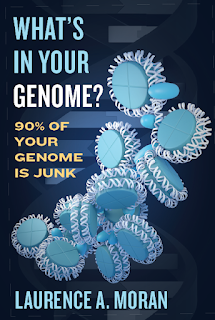A junk-filled genome Review of: What’s In Your Genome? 90% of Your Genome Is Junk, by Laurence A. Moran, 2023. University of Toronto Press. 392 pp. ISBN: 9781487508593 Norman A Johnson Evolution, qpad176, [10.1093/evolut/qpad176]
"The subject matter in this book is not easy. Molecular biologists might well be challenged by the population genetics theory, while the biochemistry details may vex evolutionary biologists. Moran does an excellent job at presenting both of these aspects. I am also glad that he provided a historical perspective, showing that many of the current debates have a long history.
In the Preface, Moran states that he was motivated to write this book in part due to what he views as failures in science communication regarding the nature of the genome. He reminds us about the importance of accuracy in science communication: “No matter how good your style, if the substance of what you are communicating is flawed, then you are not a good science communicator” (xiii). Narratives are useful in communicating science, but when they (or the hype) get in the way of telling the truth, the science, and the science communication suffer."

5 comments :
Do you have any plans to get this released on Audible? I guess it may be difficult to convert to that format given the number of diagrams etc in the book
Nice review from Norman. Of course it's in Evolution, which is preaching to the choir. Evolutionary biologists already tend to know your takehome message. It's the molecular biologists who need to be informed. JME or MBE might get closer to the mark. Or perhaps Science or Nature, which have done so much to spread the myth.
Agree. Even in JME and MBE many of the readers will be already receptive. There are hardly any molecular evolutionists who believe the ENCODE argument. Now, if it could be reviewed in Cell that would be a different story. Science and Nature are of course the ones that need to be pressured into confronting the issue.
Johnson writes: "Still, probably the best way to estimate the fraction of the genome that is junk is to look for the extent of sequence conservation. Regions of the genome that are functional are usually under strong purifying selection; thus, they evolve slower than disposable junk. Estimates of the fraction of the genome under such selective constraint generally fall under 10%. Because some parts of the genome are currently under selective constraint but have not been so for sufficiently long periods of time to show up as having low divergence , this figure is a lower bound."(my italics)
This raises the question of "The Logic of Transgenerational Inheritance: Timescales of Adaptation." (Desgupta et al. 2023 Ann Rev Cell Dev Biol).
Johnson opines: "Still, 10% conserved (or 90% junk) is a reasonable estimate." The "antibody RNA hypothesis," kindly give space in Sand Walk for some decades, suggests otherwise.
Larry is too modest to tell you, but University of Toronto Press is having a Black Friday Sale, 40% off all books, November 21-27. That would reduce the hardcover version to about $25.
Post a Comment